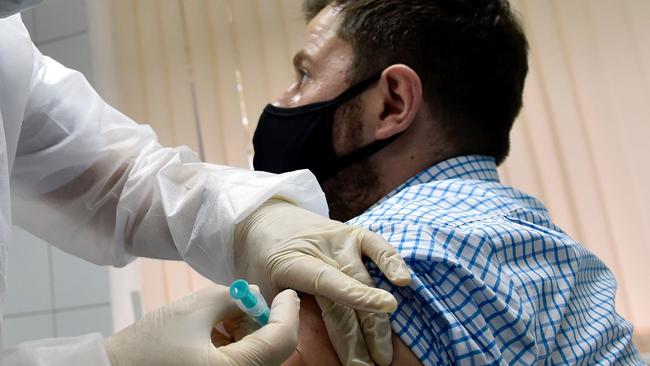Russia vs China vs the rest of the world in race for a Covid vaccine
Vaccines usually take decades to perfect, but by next year you’ll be proffering an arm for the coronavirus vaccine — with elderly people and healthcare workers first in line.

The Morrison government is spending $1.7bn on securing two of the 40 different coronavirus vaccines undergoing clinical trials around the world, and it expects the first doses to become available from January.
It’s a big bet. Governments and pharmaceutical companies in numerous countries have thrown massive resources at COVID-19 immunisation studies, another 151 vaccine candidates are under preclinical evaluation.
The candidates are varied. Oxford University and AstraZeneca’s vaccine, which is in the Morrison government’s supply deal, is considered the most advanced, despite its phase-three trials being halted twice in the past month when two participants developed neurological illnesses after being injected with the experimental drug.
Meanwhile, China’s People’s Liberation Army has joined the race, and the Russian government has approved use of its Sputnik V vaccine before it has completed large-scale human trials.
The global assault has fast-tracked vaccine development — which normally takes 10 to 15 years — prompting many to question whether it will be safe and effective when it arrives, particularly given that the most vulnerable members of the community will be given the first jabs.
CSL, which has signed an agreement with the federal government to produce 80 million vaccine doses — 30 million of the Oxford/AstraZeneca candidate and 50 million of a vaccine CSL has been developing with the University of Queensland — has offered assurances that safeguards will not be compromised in the accelerated vaccine development.
“We have had good robust discussions with the TGA (Therapeutic Goods Administration),” CSL senior vice-president of research and chief scientific officer Andrew Nash said this month.
“We all demand of ourselves the need for high-quality manufacturing and adequate safety in the clinical studies, so I can reassure people we are not cutting corners (while) acting with the appropriate sense of urgency.”
Health Minister Greg Hunt told ABC radio the government had exercised appropriate caution before entering its supply and production deal with CSL. “We haven’t moved into this space until we felt there was strong data about safety and effectiveness … and that’s the cautious, conservative timing that we’re providing as advice.”


To join the conversation, please log in. Don't have an account? Register
Join the conversation, you are commenting as Logout